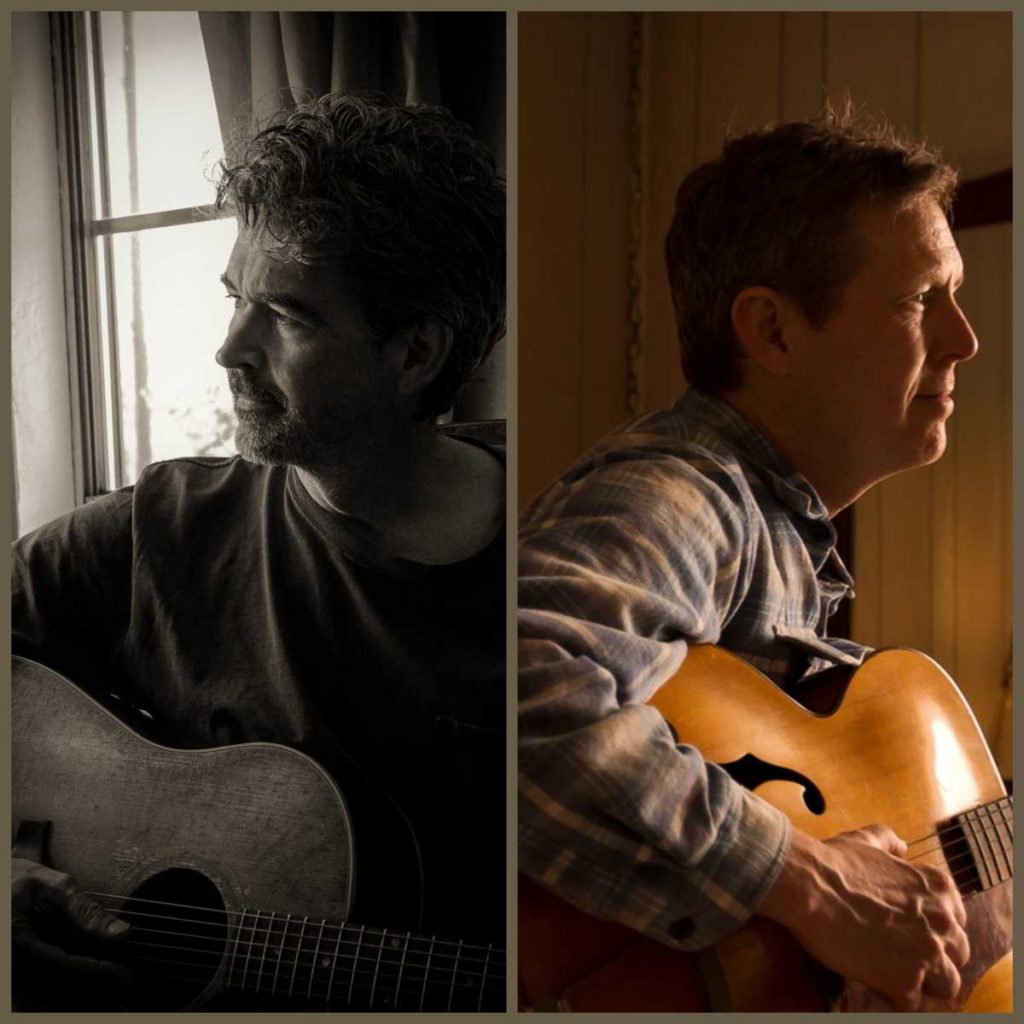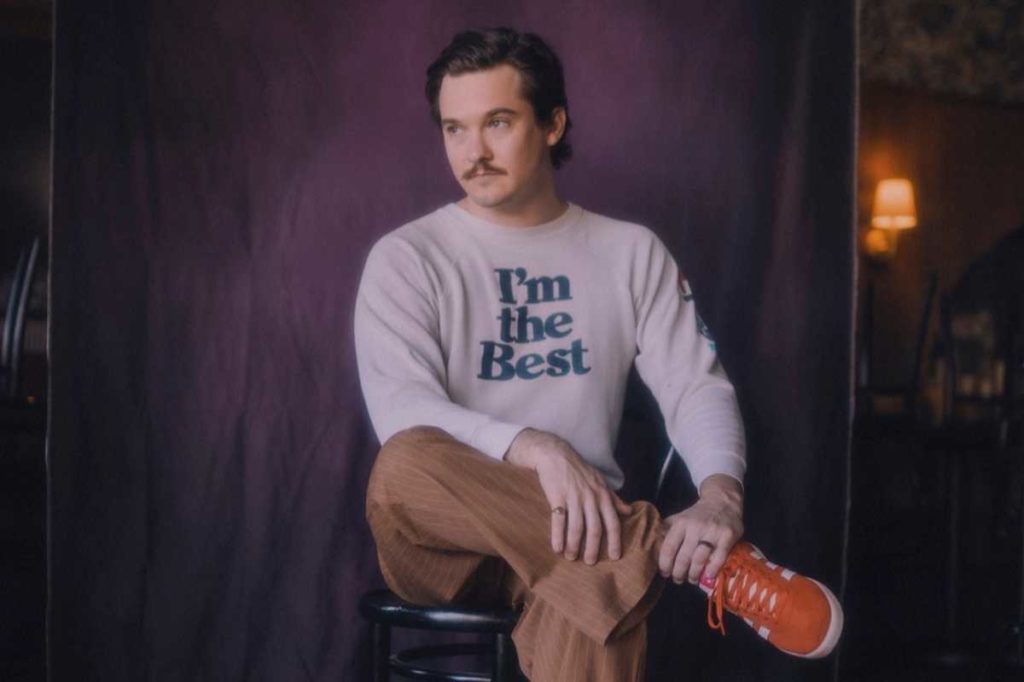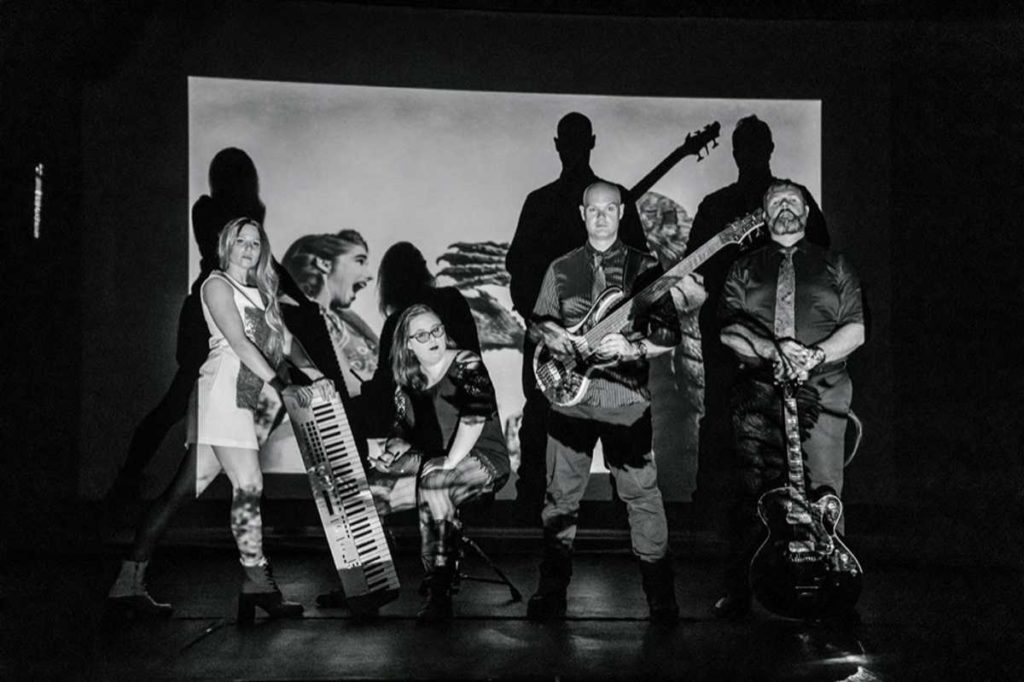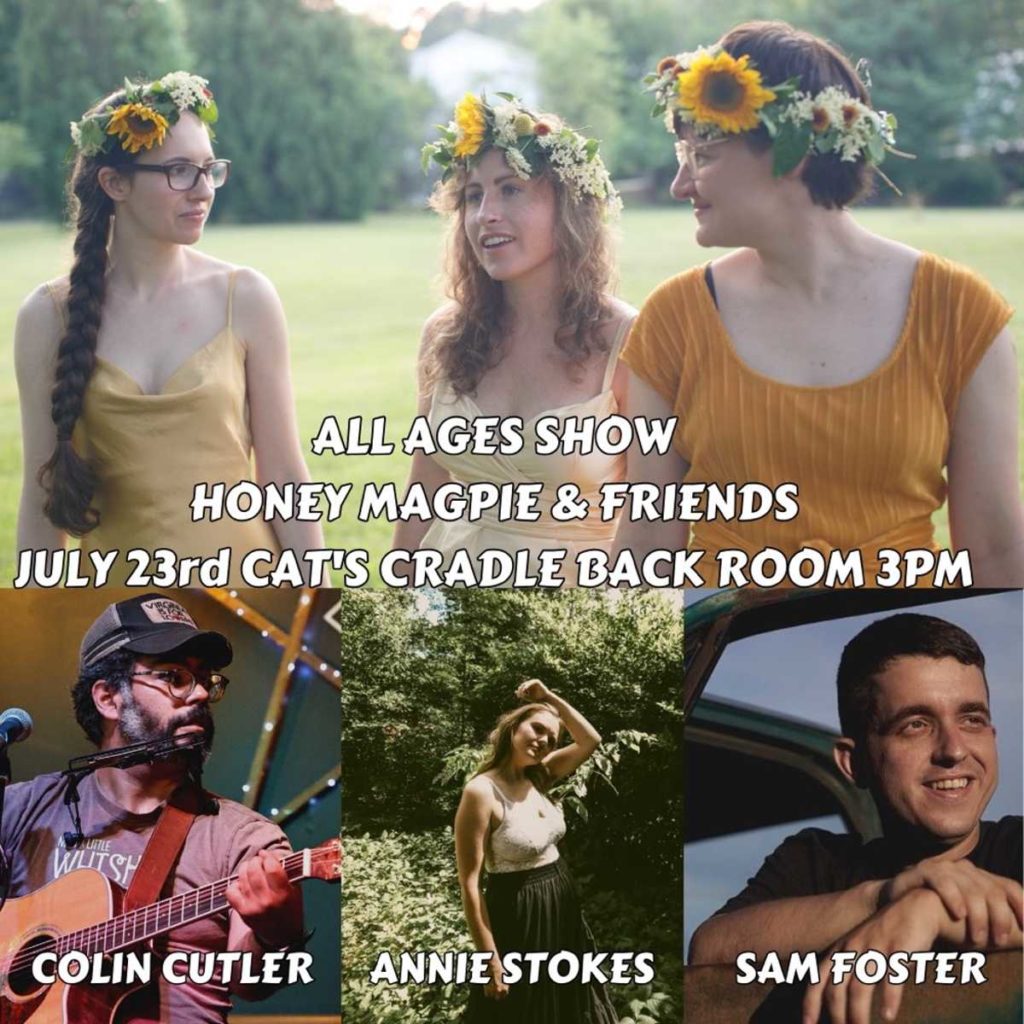Robbie Fulks / Slaid Cleaves

This is a seated show.Robbie Fulks is a singer, recording artist, instrumentalist, composer, and songwriter. His current release, Bluegrass Vacation on Compass Records, returns him to his bluegrass roots, with a large group of masterful musicians including Sam Bush, Jerry Douglas, Justin Moses, Ronnie McCoury, Alison Brown, David Grier, Tim O’Brien, Todd Phillips, John Cowan, Brennen Leigh, Randy Kohrs, Sierra Hull, Stuart Duncan, Shad Cobb, and Chris Eldridge. Across 11 new original songs (and one freewheeling interpretation of the Delmore Brothers), Robbie covers themes like small-town blues, the endurance of childhood memory, inebriation, love, divorce, the role of music in strengthening family bonds, losing a loved one to Alzheimer’s, and bluegrass itself.His most recent release, 2017’s Upland Stories, earned year’s-best recognition from NPR and Rolling Stone among many others, as well as two Grammy® nominations, for folk album and American roots song (“Alabama At Night”).Fulks was born in York, Pennsylvania, and grew up in a half-dozen small towns in southeastPennsylvania, the North Carolina Piedmont, and the Blue Ridge area of Virginia. He learned guitar from his dad, banjo from Earl Scruggs and John Hartford records. He attended Columbia College in New York City.In 1983 he moved to Chicago and joined Greg Cahill’s Special Consensus Bluegrass Band. He taught music at Old Town School of Folk Music from 1984 to 1996, and worked as a staff songwriter on Music Row in Nashville from 1993 to 1998.His early solo work — Country Love Songs (1996) and South Mouth (1997) — helped define the “alternative country” movement of the 1990s.Instagram | Twitter | FacebookTwelve new songs amid the 100,000 that get uploaded to Spotify every day (according to hypebot.com). Will any of them rise above the din enough to be heard? So far, a few of them have been hanging out with the likes of young Americana superstars Charlie Crocket and Margo Price on the Americana Music Association album and singles charts, as well as the popular Spotify playlist, The Pulse of Americana. It’s Cleaves’ second release on Candy House Media, which consists of himself and his wife and manager, Karen Cleaves, with hired gun Angela Backstrom promoting to Americana radio. It’s one of the rare self-releases on the charts, and the early success of the first few singles is a testament to the consistent quality of Cleaves’ output over the past 25 years, and to the bond he’s built and maintained with the dedicated music lovers at Americana radio since its inception in the mid 1990s. Slaid teamed up with producer Scrappy Jud Newcomb for the third time in early 2022 to record a new batch of songs, Slaid’s first in five years. Familiar themes of struggle and resilience will be a surprise to no one. TOGETHER THROUGH THE DARK digs into the crucial moments and experiences that shape our journeys. A kind word when it’s needed most, the effort to act honorably in dark and violent times, the wisdom of a barfly, the majesty of rock and roll, the dignity of work and the enduring grace provided by true love. As Scrappy puts it, “This album speaks to the hopeful, the hard working, the battered, confused, and the sad. But above all to the believers in the city of freedom that we heard in the stories of our youth and all those FM radio hits.” Bandcamp | Instagram | Twitter | YouTube
Margo Cilker

Margo Cilker’s sophomore album, Valley of Heart’s Delight, refers to a place she can’t return: California’s Santa Clara Valley, as it was known before the orchards were paved over and became more famous for Silicon than apricots. In this 11-song follow-up to 2021’s critically acclaimed Pohorylle, family and nature intertwine as guiding motifs, at once precious and endangered, beautiful and exhausting. Cilker and Pohorylle producer Sera Cahoone brought most of that record’s highly-acclaimed crew (studio players for The Decemberists, Band Of Horses, and Beirut) back to the studio with additional contributions from acclaimed Northwest traditionalist Caleb Klauder. Valley of Heart’s Delight, Cilker’s second record on Portland, Oregon label Fluff & Gravy Records, follows a year busily reaping the fruits of Pohorylle’s success, with festival appearances at Pickathon, Treefort, and End Of The Road, and tours supporting American Aquarium, Hayes Carll, Drive-By Truckers, and Joshua Ray Walker.Margo Cilker lives near the Columbia River in Goldendale, Washington with her husband, songwriter and working cowboy Forrest VanTuyl, as well their dog and some horses.Website | Bandcamp | Instagram | Twitter | Facebook
Rod Abernethy, Rebekah Todd

Rod Abernethy is a unique blend of an authentic southern folk troubadour, master acoustic guitarist, and award winning songwriter and composer for film, TV and video games and the Overall Grand Prize Winner of the 2021 International Acoustic Music Awards. In 2019 he was the Grand Prize winner of American Songwriter’s Bob Dylan Song Contest. His last album Normal Isn’t Normal Anymore, produced by Grammy nominated producer Neilson Hubbard (Mary Gauthier, Kim Richey, Glen Phillips), received rave reviews from No Depression, American Highways and The Wall Street Journal and was the Top 20 CD of 2021 at No. 11 on the Folk International Folk Charts.Rod’s talents go beyond being a dynamic performer, vocalist, instrumentalist, and storyteller. He’s a prolific photographer, a sculpture artist of whimsical steampunk found-object robots and a seasoned teacher and adjunct professor at the University of North Carolina School of the Arts in Winston Salem, NC, where he teaches how to score video games. As composer, Rod has scored and produced music for countless television shows, commercials and over 80 video games including the Electronic Art’s blockbuster hit “Dead Space” which won a BAFTA Award in 2009 for Best Use of Audio and Tolkien’s “The Hobbit” for Vivendi Universal which won the Game Audio Network Guild’s Video Game Soundtrack Of The Year in 2003.Rod continues to perform live in acoustic venues and halls across the country. Past venues include The Woodstock Folk Festival (Woodstock, IL), Club Passim (Boston, MA), The Cat’s Cradle (Chapel Hill, NC) and the ISIS Music Hall (Asheville, NC). He will also be a featured artist on this year’s popular PBS series, Songs At The Center hosted by Eric Gnesda.Website | Instagram | Twitter | Facebook | YouTubeRebekah Todd has received countless awards and recognitions including 2013 Carolina Music Awards “Best Female Musician,” 2016 winner of Floyd Fest “On The Rise” Competition, 2017 Wilma Magazine’s “Woman to Watch,” 2018 Encore Magazine’s “Best Female Musician” and much more. Rebekah is known for exhilarating performances with acts such as Karl Denson, Mavis Staples, Dr Dog, Dumpstaphunk, Artimus Pyle, Shovels & Rope, Hiss Golden Messenger, Citizen Cope, Sarah Shook & the Disarmers and Rusted Root. In addition to having her own podcast (Rebekah Toddcast), she has been featured on Michael Franti’s podcast “Stay Human.”Website | Instagram | Twitter | Facebook
Chris Farren

On his Polyvinyl debut Born Hot, Chris Farren opens with a question he’ll spend much of the album trying to answer: Why do I feel out of place in my own outer space? Telegraphing his inner narrative with a childlike candor, the Florida-born artist lays bare his most intense anxieties and — in the very same breath — documents the mildly soul-crushing minutiae of everyday life: the strange indecency of blasting AC/DC bangers through an iPhone speaker, the inexplicable bleakness of a Starbucks franchise tucked inside a Target. But with his irrepressible sense of humor and utter lack of self-seriousness, Farren defuses the pain of even the deepest insecurity, gracefully paving the way for pure pop catharsis.On Born Hot, Farren fully embodies the sensitive-goofball dichotomy found in all his work, especially his exuberant live show: a solo performance in which he plays to live-recorded backing tracks while projecting purposely wacky visuals (his own face duplicated thousands of times, text that reads “ANOTHER PERFECT SET” at the end of each closing song). By the same token, Farren went full-on tongue-in-cheek in choosing Born Hot’s title and cover art — a crudely drawn self-portrait that captures him lounging shirtless, looking every bit the ’70s-pop Lothario.”In my lyrics there’s so much self-examination that teeters on self-loathing, and I like to juxtapose that with an aesthetic that’s completely the opposite,” says Farren. “It’s a defense mechanism, because I feel embarrassed talking about my feelings so very plainly, but at the same time I also just find the idea of having that much self-confidence really funny.”In the making of Born Hot, Farren recorded in his L.A. apartment and worked entirely on his own, embedding his inventive take on classic power-pop with flashes of folk and punk and ’50s doo-wop. On “Love Theme from ‘Born Hot,'” he slips into a sunny synth-pop reverie, bringing bouncy rhythms and radiant synth tones to a heart-on-sleeve message of romantic determination. “I wrote that when two different couples in my life were splitting up, and I felt kind of rattled but also so lucky to have my wife,” says Farren. Moodier and more darkly charged, “Search 4 Me” reveals his struggle to live in the present, articulating his anxiety in pieces of fragile poetry (e.g., “And you glared at me so loudly that I burst into confetti”). And on “Surrender,” Born Hot turns exquisitely melancholy as Farren details the specific hurt of a sudden friendship breakup. “I was friends with their ex, and they told me it was too painful to stay friends with me,” Farren recalls. “‘Surrender’ is about that feeling of wanting to respect someone’s wishes, but also missing that person and just wishing you could talk to them again.”Elsewhere on Born Hot, Farren shifts from exacting introspection to more outward reflection, exploring life-changing matters like the recent death of his father-in-law and his wife’s experience of the ensuing grief. In each moment on the album, he instills his lyrics with the resolute sincerity he’s embraced since immersing himself in songwriting at the age of 17. Originally from Naples, Farren formed his first band when he was 18, later teaming up with songwriter/musician Jeff Rosenstock to co-found the indie-rock duo Antarctigo Vespucci.Website | Instagram | Twitter | Facebook | Spotify | YouTube | Soundcloud
Olive Dares the Darkness

Based in Charleston, South Carolina, Olive Dares the Darkness is a four-piece band formed in 2014 when Becca Darling sought a collaborator and joined forces with Michael Baum. With the inclusion of Danielle Carlson on drums and Mr. Minister on bass, their shared passion is anchored in dark, illustrative experimentation with foundations in electronic, industrial, darkwave, and goth. Influenced by artists such as Siouxsie and the Banshees, Nine Inch Nails, Type O Negative, and Tori Amos, Olive Dares the Darkness cultivates a unique sonic landscape that is both haunting and captivating. Their introspective lyrics delve into the darker aspects of human experience, matched with driving rhythms that intertwine to form a distinct and evocative musical tapestry.While on summer tour in support of their new musical developments, including their latest single, “Obsession,” Olive Dares the Darkness is also actively working on their highly anticipated second album, “II.” This forthcoming release will serve as a testament to their evolution and aural exploration. With unwavering dedication, Olive Dares the Darkness continues to push the boundaries of their sound, delivering music that is both authentic and thought-provoking.Website | Instagram
Honey Magpie, Annie Stokes, Colin Cutler and Sam Foster

Chapel Hill-based folk pop band Honey Magpie will showcase their comedic side at the Cat’s Cradle Back Room. At this show, “It’s Finally Ironic at the Cat Cafe: Music and Laughs with Honey Magpie, Annie Stokes, Colin Cutler, and Sam Foster,” Honey Magpie will perform their funniest songs as well as fan favorites. Known for vocal harmonies, classical string parts, and nature-inspired lyrics, Honey Magpie is fronted by singer-songwriters Rachael Hurwitz (guitar, keys) and Pippa Hoover (cello). Their first album, Honey Magpie (2017), centered on sweet, feel-good folk, but their most recent release, Midnight Morning (2020), also explored sadness, nostalgia, and disillusionment. This bittersweet repertoire earned the band the nickname “Honey Magcry,” but both frontwomen know how to laugh through the tears. Each has a long history of comedy in her creative work. Before forming Honey Magpie, Rachael and her sister Eliza made music video parodies of popular songs. In their 2013 video “It’s Finally Ironic,” Rachael and Eliza rewrote the lyrics to Alanis Morrisette’s hit “Ironic” to make them actually ironic, using examples so funny and satisfying that the video gained over a million views. Pippa has a growing catalog of comedy songs. Her bop “The Cat Cafe” — inspired by Chapel Hill’s own Cat Tales Cat Cafe — is full of cat puns and a meet-cute story that will make listeners smile. “It’s Finally Ironic” and “The Cat Cafe” will be the crown jewels in the carefully-curated comedic setlist Honey Magpie plans to perform. And to make those jewels even shinier, guest musicians Grace Bowman (violin and vocals), MK Rodenbough (bass), and Will Flowers (drums) will join Rachael and Pippa, providing full-band instrumentation. Annie Stokes, Colin Cutler, and Sam Foster will open the show. Website | Facebook | Instagram | SoundCloud | YouTube
Jesse Fox

A singer songwriter in heart and soul, Burlington born Jesse Fox has written a catalogue of more than 375 songs. His lyrics range from quick and witty to devastatingly heartbreaking and connect with the listener on the joys and sorrows of everyday life. There’s a timelessness to his songs, like it’s the soundtrack of some of your most treasured memories. With more than a thousand concerts under his belt, Jesse feels comfortable on stages large and small. He is eager to expand his musical career and is looking for partnerships with labels and managers. He currently fronts Love & Valor, one of America’s best up and coming Americana-flavored Folk bands based out of Burlington, NC. The band has been a staple in the NC folk scene since 2012, and are known for performing almost exclusively original music. Their influences range from classic singer/songwriters such as Bob Dylan and Johnny Cash, to current bands like The Avett Brothers, The Lumineers, and CAAMP. Love & Valor performs hundreds of shows each year, recently appearing at Shakori Hills Grassroots Festival, The Cat’s Cradle, River Park Festival, and many more. They just finished recording their third full length record that will be released in Q1 of 2023.Instagram | Facebook | Soundcloud
Jill Andrews

On Saturday mornings in a small bedroom in East Tennessee, ten-year-old Jill Andrews would slide Janet Jackson’s Rhythm Nation into her tape deck, jump up onto the bed, knot her t- shirt at the waist, and start jamming. She sang in front of the mirror, played all the invisible instruments, and wondered over and over about a future that would take her beyond the checkerboard lawns and fresh blacktop of the suburbs. She wasn’t left wondering for long. Just a few years later, Andrews was on tour, singing, writing, and playing with one the nation’s fastest rising Americana groups.From her years in the Everybodyfields, to her critically acclaimed solo career, to her latest collaboration, Hush Kids, which she co-founded with Nashville songwriter and producer, Peter Groenwald, Andrews has delivered irresistibly melodic, genre-bending music for nearly two decades. Anchored by frank songwriting but continuously and unapologetically evolving, Andrews’ tape deck currently hosts a range of influences from Joni Mitchell to Diana Ross to Wilco to contemporaries, Brandi Carlile and Phoebe Bridgers. The result is bold, infectious, introspective music that has served as the backdrop to some of America’s most beloved television series including Grey’s Anatomy, This Is Us, Nashville, and Wynnona Earp, to which she composed the theme.Modern Age, her latest release, is an unironic return to that small pink bedroom in East Tennessee, a meditation on childhood and changing times, growing up and looking back. In moments, the epitome of 90s pop perfection with airy synths and shimmering vocals and in others, pared down and heart wrenchingly intimate, Modern Age is dripping in reverence for a simpler time, when the world was as big as your high school, when love was waiting by the phone, when we wondered about the future instead of lived in it. With addictive hooks that evoke Susannah Hoffs and Kate Bush, Modern Age is at once a time capsule of and a love letter to the places we all began.Website | Bandcamp | Instagram | Twitter | YouTubeLittle HopesWebsite | Spotify | Facebook | Instagram
Cian Ducrot

Website | TikTok | Instagram | Twitter | Facebook | Spotify | YouTube | Soundcloud
Shamarr Allen

Shamarr Allen is the definition of New Orleans Music! Hailing from the Lower 9th Ward of New Orleans, Allen has influences in jazz, hip hop, rock, funk, funk blues and country. He is the lead vocalist and trumpeter of his band “Shamarr Allen and the Underdawgs” In addition to performing with his band, Allen has collaborated with many renowned artists such as Willie Nelson, Galactic, Mannie Fresh, Patti Labelle, Harry Connick Jr. and Lenny Kravitz to name a few. In addition to displaying his skills on the frontline as a lead performer, Allen is also a music composer, writer, producer and multi instrumentalist. With a scintillating and unique sound, look and exemplary talents, Allen transcends musical boundaries. He is the True Orleans Experience!Website | Facebook | Twitter | Instagram | Soundcloud

